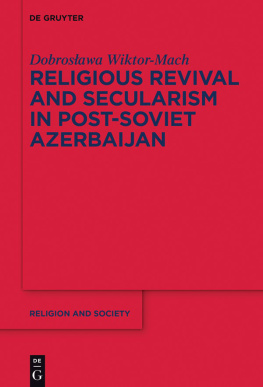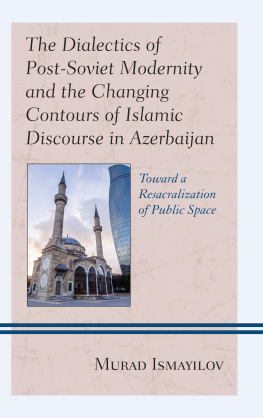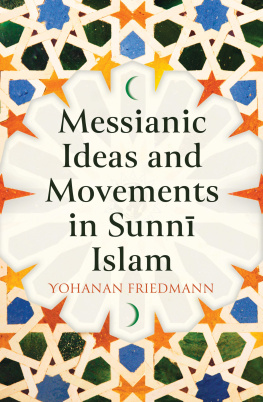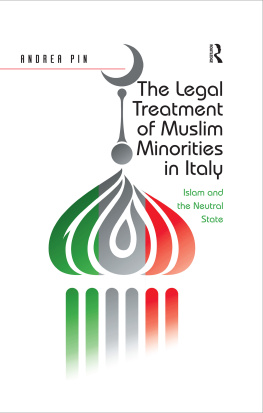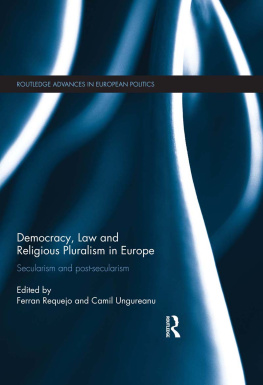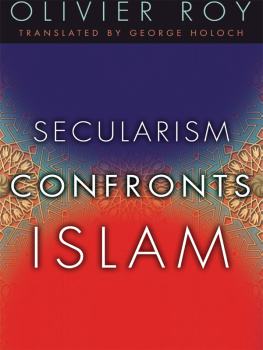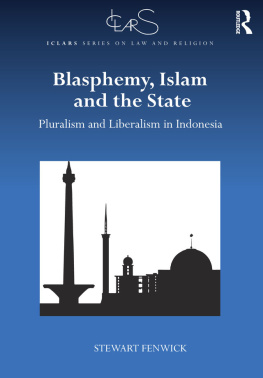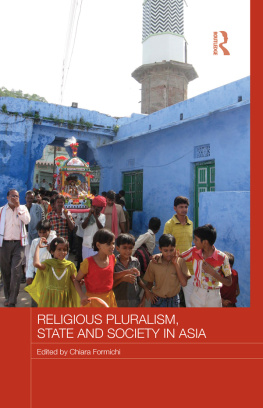Contents
Guide

Dobrosawa Wiktor-Mach
Religious Revival and Secularism in Post-Soviet Azerbaijan
Religion and Society

Edited by
Gustavo Benavides and Kocku von Stuckrad
Volume 71
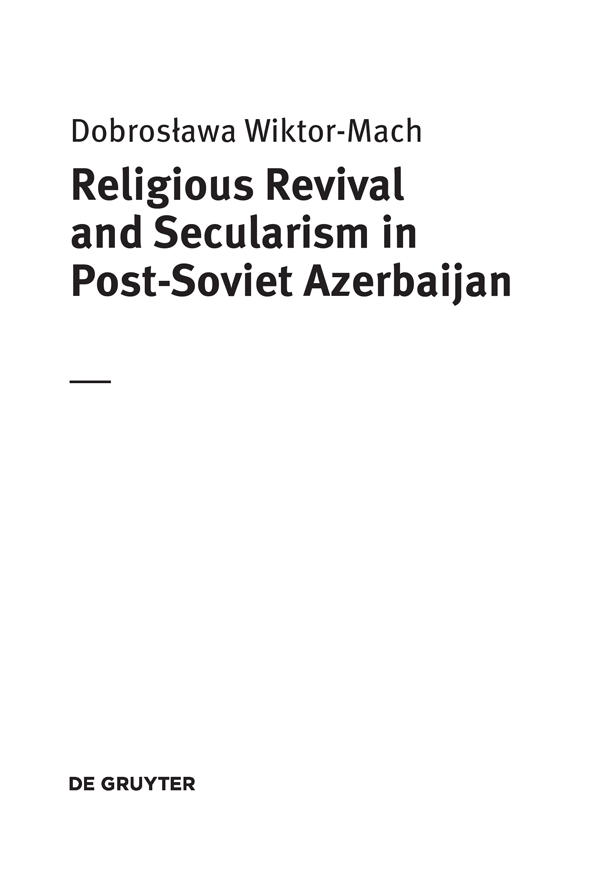
ISBN 978-3-11-053462-7
e-ISBN (PDF) 978-3-11-053646-1
e-ISBN (EPUB) 978-3-11-053463-4
ISSN 1437-5370
Library of Congress Cataloging-in-Publication Data
A CIP catalog record for this book has been applied for at the Library of Congress.
Bibliographic information published by the Deutsche Nationalbibliothek
The Deutsche Nationalbibliothek lists this publication in the Deutsche Nationalbibliografie; detailed bibliographic data are available in the Internet at http://dnb.dnb.de.
2017 Walter de Gruyter GmbH, Berlin/Boston
www.degruyter.com

ikhtilf al-umma ra ma
(Difference within the Islamic tradition is the sign of Gods mercy)
the Prophetic tradition
Acknowledgements
I would like to express my deepest gratitude to Dr. Elnura Azizova from the Khazar University in Baku, who invited me to her Department of Eastern Languages and Religious Studies, and to all of the people of this university who facilitated my research stay. I would like to thank Sofie Bedford who helped me in the initial phase of the project. I wish to offer my sincere thanks to scholars from Baku State University, the Caucasus University, Azerbaijan National Academy of Sciences, and Azerbaijan Diplomatic Academy for their inspiring insights to my research problems.
I would like to convey my gratitude to the people whom I have interviewed in Baku, who have devoted their time to share with me their experiences and opinions, and to those who have assisted me on various phases of my research. Special thanks are owed to the akhunds and imams of various Baku mosques for their kindness and willingness to answer my questions.
My special appreciation is also due to my supervisor Professor Maria Flis, as well as to my colleagues at the Department of Social Anthropology of Jagiellonian University. During seminars I had opportunities to present and discuss my work at its various phases.
I am also grateful to the Bratniak Foundation of Jagiellonian University which covered some of the costs of the field work.
Last but not least, I would like to express my sincere thanks to my friends and family for their support and encouragement.
List of Tables and Figures
Tables
Figures
Note on Transliteration
Arabic terms related to Islam have been transcribed into English using the standard scientific transliteration system devised for the Deutsche Morgenlndischen Gesellschaft. Following the recommendation of the Chicago Manual of Style (1982) that familiar words and phrases in a foreign languages should be set in roman type, Arabic words that can be found in a standard English dictionary are treated as belonging to international English. The words such as Islam, Koran, jihad, sharia, for instance, are written as they are, instead of Islm , Qur n , ihd , and ar ah . Since familiarity is relative, in some cases I have made a decision about transliteration in an arbitrary way. Some terms and concepts employed in this work have Arabic roots but in Azerbaijan are used in their Turkic or Persian variants; in that case I adhere to a simple transliteration. The plural of more familiar Arabic words is formed by adding s to their singular forms (e. g., fatwas and hadiths.) Most of these words with short explanations are included in the glossary at the end.
Transliteration of Russian has been done in the system developed by the United States Board on Geographic Names and by the Permanent Committee on Geographical Names for British Official Use.
Names of public figures, places and organizations are written according to their most common English spellings. For instance Aliyev, Baku, Caucasus Muslim Board. In some cases my choice was rather arbitrary as there is not one accepted form, in other individuals changed their names themselves and are referred to by both names as for example Nasib Nassibli, born as Nasibzade, who worked as Azerbaijans ambassador to Iran.
Introduction
This book came into being as a result of an interest in a world religion that has over 1.6 billion adherents, or 23% of the worlds entire population. Despite the enormous geographical, social and political diversity of the Muslim world, Islam is commonly perceived as a cultural monolith in which Arab perspective on religion prevails. There is a great need in our time to shed more light on the inner complexities and nuances that are typical of each major religion, as they again, since the 1970s, reemerge as significant social and political forces. The revival of religion and its deep impact on the public life is a phenomenon characteristic of our times. At the beginning of the 21st century Islam is surrounded by numerous stereotypes and prejudices, even on the part of elites. In the West, Islamophobia is on the rise and the knowledge of Islam superficial. Few associate Islam with democracy and modernity, even fewer with secularization.
This book focuses on the phenomenon of competition inside Islam in Azerbaijan. Shia and Sunni Muslim movements and groups try to attract people to their religious branches. Salafis promote the pristine Islam with a global appeal. Shias, on the other hand, underline rationality in their faith tradition. Theres a growing popularity of the Turkish model of Islam. Sufism, although not as powerful as before, finds also a committed audience. Competition requires at least a minimum level of pluralism and an active engagement of religious actors. Even though during communism there were more forms of religion than officially allowed by the state, it was not until the end of the Soviet Union that Islam revealed its variety in the Muslim-majority republics. After seventy years of imposed secularism and atheism, religion could eventually find its place in the public sphere. Novel possibilities were quickly exploited by many groups, communities and individuals proposing their interpretations of religions. The inner struggle between various branches and their representatives became a fascinating account of power relations grounded in political, economic and socio-cultural contexts. Also symbols play a significant role. Forms of religions are in a constant flux, they emerge under certain conditions, evolve, face challenges from political power, from science and other ideologies and also from other religious actors ready to take part in the game. New religious movements and groups challenge existing practices, ideas and structures, offering believers additional choices, novel ideologies, as well as services, and social networks. Some religious communities give up, losing adherents, some adjust to meet the changing demands for religion and its forms, others flourish and gain fervent supporters. The contemporary Islamic resurgence offers a living laboratory of religious change, its determinants and effects. Islamic movements and communities act not only in a particular socio-economic context but, whats equally important, they respond to each others moves and actions. They operate in a common religious market, propose reinterpretations of Islam responding to the needs of post-communist societies. Global religious movements adjust to the local context and experiences. Their actions are not independent, but take place in a constant, more or less conscious, process of interaction and mutual inspiration, or conflict.

